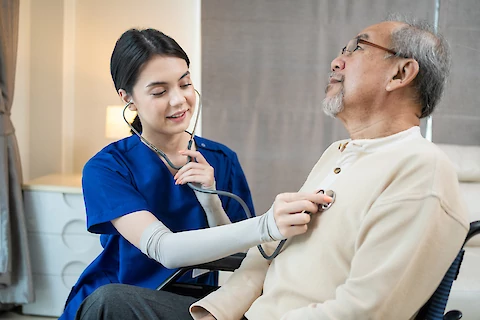
Understanding your resting and active heart rates is an important indicator of overall health as a senior. As we age, our bodies become more prone to all sorts of ailments, including cardiovascular diseases that could be life-threatening if not addressed properly. Seniors or anyone else who may encounter impending problems with their cardiac health should understand what their normal heart rate numbers should be and how they can safely monitor them from the comfort of home. To measure your resting and active heart rate, follow these tips from Senior Helpers Mesa.
How to Measure Your Resting Heart Rate
Measuring resting heart rate is a meaningful way to gauge your overall cardiac health. For seniors and most adults, the optimal resting rate should be between 60 and 100, according to the American Heart Association. A lower resting heart rate is better.
Fortunately, this measurement can easily be taken by placing two fingertips on either your wrist or collarbone and counting the number of beats you feel in one minute. You can also count for 30 seconds and then multiply by two. If you find that your heart rate numbers are significantly higher than around 80 BPM during restful conditions, then it's recommended that you get seen by a doctor for further testing.
How to Measure Your Active Heart Rate Safely
To measure your active heart, engage in physical activity you feel comfortable doing. This may include a brisk walk, low-impact exercises, or swimming. After a few minutes, measure your heart rate in the same way that you did before for your resting heart rate. If you have a heart rate monitor or smartwatch, these devices can assist you in finding your active heart rate.
According to the American Heart Association, 60-year-old seniors should aim for a target active heart rate of 80 to 136 beats per minute. 70-year-old seniors should aim for 75 to 128 beats per minute.
What Steps They Should Take if Their Heart Rates Are Too High
If your heart rate is above the normal resting or active ranges, it's best to consult a doctor as soon as possible. A doctor can get an even more accurate reading of your condition and assess your medical condition. A doctor can monitor, diagnose, and treat any conditions as needed. They can also give pertinent advice on staying fit while protecting your heart's health.
What Factors Affect Your Heart Rate?
Many factors can influence your heart rates, such as stress and anxiety, alcohol or caffeine consumption, exercise intensity, medication use, and overall lifestyle habits. For this reason, it's essential to take note of any changes you may be experiencing concerning your resting or active heart rates. Then, you can make necessary adjustments with your doctor's consent immediately if needed.
Senior Helpers Mesa Provides Caregiving Services
If you are interested in personalized caregiving services, turn to Senior Helpers Mesa. We proudly help seniors in Mesa, Apache Junction, Scottsdale, Fountain Hills, and Cave Creek. Contact us today to learn more about our in-home caregiving services.